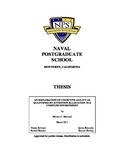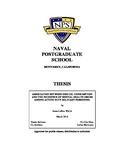An exploration of cognitive agility as quantified by attention allocation in a complex environment
| dc.contributor.advisor | Kennedy, Quinn | |
| dc.contributor.author | Mariscal, Miriam C. | |
| dc.date | Mar-17 | |
| dc.date.accessioned | 2017-05-10T16:31:52Z | |
| dc.date.available | 2017-05-10T16:31:52Z | |
| dc.date.issued | 2017-03 | |
| dc.identifier.uri | https://hdl.handle.net/10945/53014 | |
| dc.description.abstract | This thesis supports the Army's mission to establish a measure for cognitive agility in soldiers. It examines attention-allocation patterns as quantified by eye-tracking data collected while subjects played a military-relevant cognitive agility computer game (Make Goal), to determine whether certain patterns are associated with effective performance. It also investigates the effects of stress on cognitive agility as measured by attention allocation. Methods: Forty military officers were randomly assigned to a stress or control group. Stress level was manipulated by timed turns and experimenter behavior. Results: Eye-tracking data was analyzed in terms of regions of interest on which subjects focused their cognitive workload. Results were analyzed by stress and control group and top and bottom ten performers. The stress and control groups showed similar attention-allocation patterns. The high performers attended more to the important information and made more optimal selections than poor performers. Discussion: Results are discussed in the context of the Yerkes-Dodson stress model. Eye-tracking data revealed attention-allocation patterns associated with higher performance. In order to better detect the impact of stress on Cognitive Agility, an experiment that includes a wider range of stress levels is needed. | en_US |
| dc.description.uri | http://archive.org/details/anexplorationofc1094553014 | |
| dc.publisher | Monterey, California: Naval Postgraduate School | en_US |
| dc.rights | This publication is a work of the U.S. Government as defined in Title 17, United States Code, Section 101. Copyright protection is not available for this work in the United States. | en_US |
| dc.title | An exploration of cognitive agility as quantified by attention allocation in a complex environment | en_US |
| dc.type | Thesis | en_US |
| dc.contributor.secondreader | Buttrey, Samuel | |
| dc.contributor.department | Operations Research (OR) | |
| dc.subject.author | eye tracking | en_US |
| dc.subject.author | cognitive agility | en_US |
| dc.subject.author | attention allocation patterns | en_US |
| dc.subject.author | stress | en_US |
| dc.description.service | Lieutenant, United States Navy | en_US |
| etd.thesisdegree.name | Master of Science in Operations Research | en_US |
| etd.thesisdegree.level | Masters | en_US |
| etd.thesisdegree.discipline | Operations Research | en_US |
| etd.thesisdegree.grantor | Naval Postgraduate School | en_US |
| dc.description.distributionstatement | Approved for public release; distribution is unlimited. |
Files in this item
This item appears in the following Collection(s)
-
1. Thesis and Dissertation Collection, all items
Publicly releasable NPS Theses, Dissertations, MBA Professional Reports, Joint Applied Projects, Systems Engineering Project Reports and other NPS degree-earning written works.





